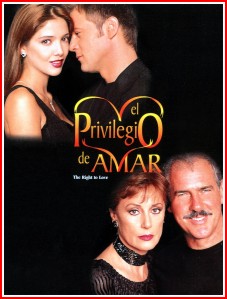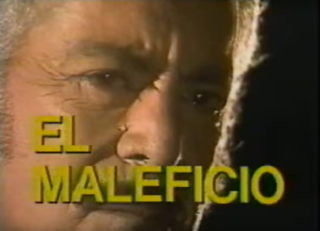
Maribel Guardia is a Costa Rican-Mexican actress, tv host, model, singer and beauty pageant titleholder. She was the winner of Miss Costa Rica 1978 and a contestant in Miss Universe 1978.

Amigas y rivales is a Mexican juvenile telenovela produced by Emilio Larrosa for Televisa in 2001. On Monday, February 26, 2001, Canal de las Estrellas started broadcasting Amigas y rivales weekdays at 7:00pm, replacing Primer amor, a mil por hora. The last episode was broadcast on Friday, November 9, 2001 with El juego de la vida replacing it the following Monday.

Azela Robinson is a British Mexican actress. She has portrayed antagonistic characters in the Mexican telenovelas Cañaveral de pasiones (1996), Contra viento y marea (2005), Llena de amor (2010) and Yo no creo en los hombres (2014).

Leonor Elizabeth Ceballos Watling is a Spanish film actress and singer.

El privilegio de amar is a Mexican telenovela produced by Carla Estrada for Televisa. It aired on Canal de las Estrellas from July 27, 1998 to February 26, 1999. El privilegio de amar is a remake of the 1985 Venezuelan telenovela Cristal. El privilegio de amar is the highest-rated television program in Mexico to date; it registered an average of 34.8 percent of TV audience. The telenovela received the TVyNovelas Award for Best Telenovela in 1999.

Manolo Morán was a Spanish film actor.
Aida María Zerecero Pierce is a Mexican actress and comedian, best known internationally for her work on various telenovelas and comedy series that have aired on Televisa over the years. Most of her television series have aired on television networks in other countries, most notably Univision.

Niña de mi corazón is a Mexican telenovela produced by Pedro Damián for Televisa that aired on Canal de las Estrellas from March 8, 2010 to July 9, 2010. It is a remake of the Mexican telenovela Mi pequeña traviesa, also produced by Pedro Damián.

Ángel de Andrés Miquel was a Spanish theatre actor and director.

Mexican sex comedies are films within the comedy film genre of the Mexican cinema industry, though in a class of their own. The storylines typically revolve around themes of sexploitation and "Mexploitation". They are mostly recognized as low-quality films with fairly low budgets. The genre peaked in popularity in the 1970s and 1980s. Although the films had sexually suggestive plots and used numerous comedic innuendos and double entendres, they were not overtly explicit, and were never considered to be pornographic. Furthermore, it was not uncommon for the male characters in these films to comedically fail in their attempts to win over, or have sex with, the female characters. When a man was successful in wooing a woman, the performances were deliberately over-exaggerated and pantomime-like, aiming to generate laughter more than arousal. The genre is similar to, and possibly influenced by, Italian erotic comedies. The popular term "ficheras films" came from the film Las ficheras, produced and released in 1975, which told the stories and experiences of many dancing women who entertained men at nightclubs.

El maleficio is a Mexican supernatural horror telenovela directed by Raúl Araiza and produced by Ernesto Alonso for Televisa in 1983. The telenovela was so successful in 1983 that a sequel was made under the title of El maleficio 2: Los enviados del infierno in 1986.

Serafín, is a Mexican telenovela fused with 3D animation for any characters produced by José Alberto Castro for Televisa in 1999.
Prisionera de amor is a Mexican telenovela produced by Pedro Damián for Televisa in 1994.

Tú y yo is a Mexican telenovela produced by Emilio Larrosa for Televisa in 1996.
Preciosa is a Mexican telenovela produced by Pedro Damián for Televisa in 1998.

5 viudas sueltas is a Colombian telenovela produced and broadcast by Caracol Televisión, with co-production of Sony Pictures Television, starring Coraima Torres, Angélica Blandón, Heidy Bermúdez, Luly Bossa, Andrea Gómez, Diego Cadavid, Ricardo Leguizamo, Ernesto Benjumea and Rodolfo Valdez. It premiered on Caracol Televisión on May 27, 2013 and concluded on January 10, 2014.












